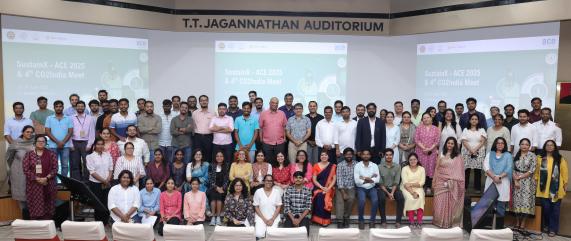
IIT Madras School of Sustainability Hosts National Meet to accelerate India’s decarbonization and energy transitions
- 25th Jun 2025
-
Press Release
Indian Institute of Technology Madras’ (IIT Madras) School of Sustainability organised ‘SustainX – ACE 2025 & 4th CO2India’ Meet from 21- 24 June 2025 to explore cutting-edge solutions and strategies for achieving economy-wide decarbonization and energy transition goals from an Indian perspective.
India, the world’s third-largest energy consumer, is targeting to add 500 GW of non-fossil fuel capacity by 2030. The conference and the reports presented during the meet collectively reinforce the urgency and opportunity for collaborative, city-led action in achieving this goal.
The events were organised in collaboration with WRI India, an independent research organisation focused on environmentally sound and socially equitable development in India and The CO2India Network, a collaborative platform is dedicated to driving innovation in CO2 sequestration.
In his inaugural address, Shri V. Arun Roy, IAS, Principal Secretary, Industries, Investment Promotion and Commerce Department, Government of Tamil Nadu, said, “Green (energy) transition is the State’s focus. The Government views this as a constitutional duty and moral imperative. Energy transition will also provide an opportunity for economic growth and the creation of jobs.”
The event brought together a diverse and dynamic body of 200 experts and delegates from academia, think tanks, Ministry officials, professional scientific societies, and the private sector, deeply invested in Carbon Capture Utilisation and Sequestration (CCUS), renewable energy systems, climate policy, and green and sustainable finance.
Addressing the delegates, Prof. Rajnish Kumar, Head, School of Sustainability, IIT Madras, said, “As a synergistic space with ‘inter-disciplinarity’ as its mantra, IITM’s School of Sustainability pursues actionable research bridging gaps among science, policy and business practices, develops innovative capacity-building programs for students, industry professionals and policymakers, and offers inclusive spaces for open dialogues among a diversity of stakeholders for co-strategizing Sustainability.”
The Meet explored innovative strategies for a low-carbon future with Students & researchers gaining access to expert insights, climate-smart technologies & critical social/environmental dimensions.
Highlighting the importance of interdisciplinary platforms for accelerating India’s net zero journey, Prof. Raghunathan Rengaswamy, Dean (Global Engagement), IIT Madras, and a plenary speaker at SustainX – ACE 2025 & 4th CO2India Meet, expanded upon how industrial decarbonization should be mainstreamed via novel tool kits including IIT Madras’ Climate Action Tool.
Climate change poses an unprecedented challenge to the planet, necessitating urgent action to reduce greenhouse gas emissions and transition to a sustainable, low-carbon future that is just and equitable. Developing economies such as India, with over a billion people onboard, are among the most hard-pressed against accelerated climatic threats, in constant need of solutions in shaping new systems and safeguarding the existing.
Planning a sustainable and prosperous India calls for joining hands and heads, looking for ideas that are cross-cutting across sectors and across traditional disciplinary boundaries of science, technology, and humanities.
WRI India, a leading research organization, and core partner in SustainX – ACE 2025 Conference, released its report titled ‘How Cities Can Support India’s Clean Energy Transition – Studying India’s Clean Energy Transition Through its Cities’ in the presence of Shri Vikram Kapur, IAS, Additional Chief Secretary, Government of Tamil Nadu.
The report presents a review of energy transition journeys of 10 cities across India to assess opportunities and challenges in the implementation of clean energy and energy efficiency interventions in buildings, transportation and municipal operations within city limits. Cities are responsible for three-quarters of the global energy use. India’s urban population is likely to go up by 43.2% of India’s total population by 2035, and urban residential electricity use may reach 50% by 2040.
The study urges stronger city-state collaboration, innovative financing mechanisms, integrated urban-energy planning and ensuring social inclusion in decision making to achieve sustainable localised energy transitions.
Speaking about this study, Ms. Sumedha Malaviya, Program Head, Building Decarbonization, WRI India, said, “It is critical for cities to be enabled to raise finance, have access to innovation, and act as owners, regulators and facilitators for better governance. They also need to be provided with capacity-building support to better plan for a climate-stressed world. Further, our analysis points to the need for an equity-driven approach in energy transition to ensure the benefits are accrued across communities, especially the urban poor.”

